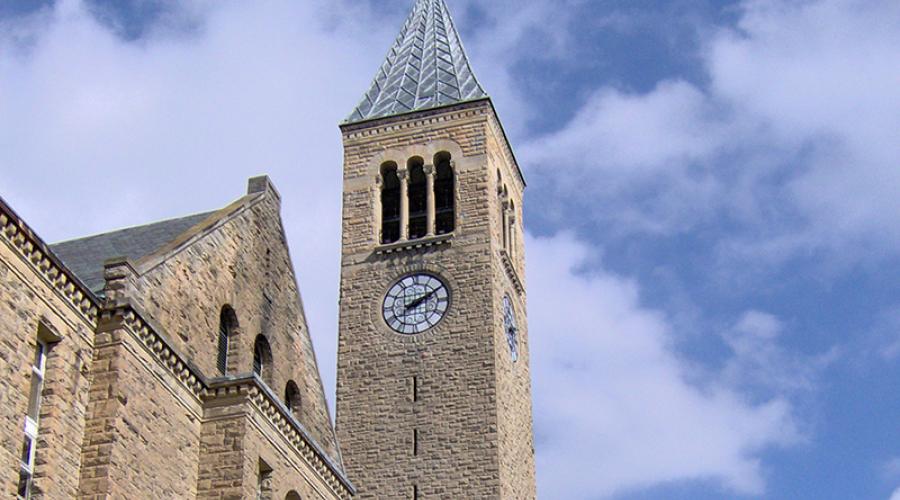
Radical Collaboration
Cornell Provost Michael Kotlikoff called in October for the university to begin elevating its strategic “radically collaborative” discipline areas to point the way toward discoveries and solutions of tomorrow. Within ILR’s outreach initiatives, such collaborative projects are beginning to take form.
This hybrid approach can be seen within the work of the ILR School’s K. Lisa Yang and Hock E. Tan Institute on Employment and Disability, concentrated on advancing opportunities for individuals with disabilities.
The institute is currently driving forward two initiatives within the radical collaboration theme.
Exploring conditions, maximizing productivity
The first, still in its infancy, is an effort to work with new interdisciplinary partners across Cornell, as well as external partners, to further its research and work in 2017. Targeting the area of innovation in the world of work, the project hopes to enhance employment outcomes for previously marginalized groups.
“We are interested in exploring how companies can craft employment conditions to maximize productivity and meaningful engagement across diverse populations, including those with nonvisible disabilities, such as autism, cognitive, intellectual, learning or mental health situational conditions,” said Susanne Bruyère, institute director and ILR professor of Disability Studies.
“We want to identify individuals with both academic expertise and in-depth field experience who can assist us in this mission of identification of methodologies and areas of expertise not previously applied to these important issues.”
Seed funding for an 18-month period beginning in January 2017 has been made available to several Cornell University project teams to increase opportunities for workforce and workplace inclusion of previously marginalized workers, especially those with disabilities and chronic health conditions.
Improving employment outcomes
The second, entitled “Technology and Work: Improving Employment Outcomes for People with Disabilities,” is a proposed collaborative conference that would include broad representation on the Cornell University campus of collaborators of distinct, but related, interests.
Partners with the YTI team on the project include staff and faculty from the College of Engineering, Computer and Information Sciences, Cornell Tech, and the Entrepreneurship@Cornell Program, as well as Tikkun Olam Makers, a global community organization helping people with disabilities develop open source technological solutions to meet their needs.
The purpose of the conference is to bring the resources of Cornell to bear on the current need to prepare young people with disabilities for jobs in the technology industry and to contribute to needed innovation in the design of communication and information technologies that are accessible to individuals with disabilities being designed by technology companies.
“A first step in this process is to assemble the scholarly and technical talent of the Cornell University campus to have a dialogue on these issues, engaging others from around the nation and world who have a unique expertise and interest in this topic,” Bruyère said.
According to Bruyère, the conference being planned for a New York City venue will provide the opportunity to initiate such dialogue, build partners across the university and with others of similar interests. New partnerships will enable scholars and practitioners to design projects that create new knowledge and initiatives.
“Beyond the event itself, the learning gained should also be contributed more broadly to the public discourse around these issues,” Bruyère said. “To address this purpose, a scholarly publication, and preferably a collection of them in the form of a special issue of a journal, will be produced from papers presented and panel discussions held.”
In addition, a core committee of represented collaborating Cornell University colleges will be tasked with discussions about needed next steps to infuse the learnings into the Cornell University curriculum, through collaboration on an across-campus course that includes engaged learning elements.
“We have a current example of one such project in a collaboration between our institute, Entrepreneurship@Cornell, Cornell Tech and Tikkun Olam Makers on a Makeathon/Hackathon in April 2017 in New York City.”
The institute will work with local schools serving youth with disabilities and community organizations providing services to individuals with disabilities in the NYC/Roosevelt Island community. This includes Coler Rehabilitation and Health Services, where there is opportunity to have residents work with cross-disciplinary teams of Cornell faculty and students to identify and develop customized assistive technology to meet daily living and employment needs.
“Such products could then be made available open source or vetted for their potential commercial viability,” she said.